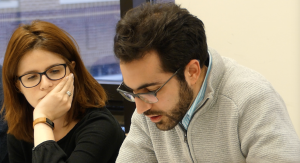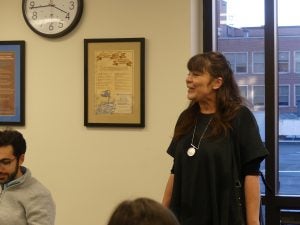There’s something kind of amazing that happens to a piece of literature when it is read aloud. It’s difficult to describe, but almost as if the words are transformed from something static into a living, breathing presence simply by being read aloud. I found this especially true during the reading and reception held to celebrate the release of the newest issue of Absinthe: World Literature in Translation this past Friday.This latest issue, “Unscripted: An Armenian Palimpsest”, showcases the work of contemporary Armenian authors who produce literature and poetry from across the Armenian diaspora.

Michael Pifer reads his translation of “Aleppo, Aleppo” by Maroush Yeramian
The issue is made even more special because it is one of the few collections of this type of work available today. What made this event particularly exceptional for me, and I suspect the rest of the attendees, is knowing that each of the readers had personally translated and edited the very work that they were reading.

Tamar Boyadjian, guest editor and contributor for “Unscripted: An Armenian Palimpset”
Having read through the entire issue a few times before this event, I considered myself fairly familiar and rather fond of its contents. However, I was unprepared by how much my appreciation and understanding of each piece would grow after hearing them read aloud. Maybe it was the fact that every word read was one that had been the focus of considerable deliberation that made these readings so meaningful. Or perhaps it is that each voice provided a depth of emotion and inflection that simply cannot be replicated in print. Whatever it was, I’m glad so many people had the chance to see months of work come together.
In addition to my blog posts chronicling translation projects taking place across campus, I have also worked as the undergraduate intern for Absinthe over the past semester, hence my familiarity with the issue. So this event was certainly doubly exciting for me! While I certainly wasn’t in the middle of any huge decisions regarding the journal, I had chance to witness how translation efforts come together at the most formal levels. Primarily, this involved an astounding level of collaboration and communication to ensure all contributors were on the same page and pleased with the final product.
Along with many things I learned about coordinating so many moving pieces and meeting often-difficult deadlines, my experience as an intern is especially valuable to me because it gave me a way to contextualize what I was learning about less-formal translation projects. I had the chance to speak to a variety of people on campus who are involved in some sort of translation work, whether it’s through a hobby, internship, or career. What has emerged to me from these conversations and from my experiences with Absinthe is that translation takes on a variety of different forms in daily. Rather more importantly, I’ve also found that each of these forms is uniquely valuable and valid.
Sometimes translation serves a highly practical role, as it did for Translate-a-Thon participants or medical interpreters. Here, perhaps, function outweighs grace to a certain extent, but that is not to say it is a cruder form. In a hospital, it’s absolutely vital that patients receive the most important information. But balancing that important duty with compassion for a patient’s situation is both a skill and an art. Other times, the aim of translation is to create a piece of art or to preserve a historical perspective. The process here is much more extensive and strategic, as was illustrated during my work with Absinthe and conversation with Kristin Datta.
Regardless of where it happens, translation is a key facet of everyday life, and one I am glad I had the chance to explore over the past few months. And with that, my series comes to an end. Thank you to everyone that shared their experiences with me and to everyone who has provided guidance along the way.
— Anjali Alangaden












